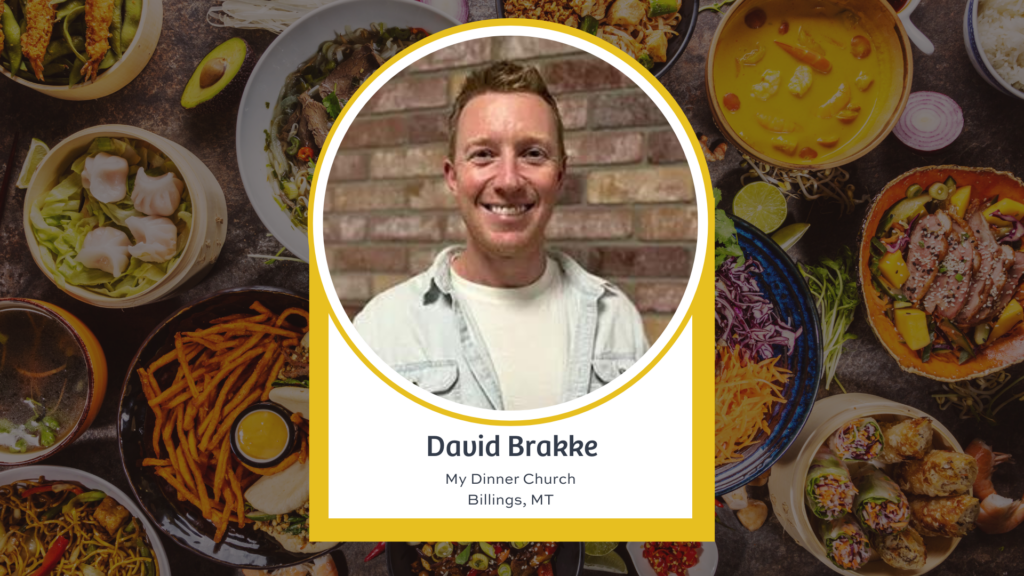Three Ways to Learn
Listen
Watch
Show Notes
David Brakke was commissioned by his church in Seattle to plant in Billings, Montana, two full states away. Today, established churches in his denomination have started Dinner Churches, and every single one now outnumbers the parent church. In this interview, you’ll hear David reflect not only on the success of this journey but also on the unique difficulties they continue to face.
David Brakke and his wife, Hailey, live in Billings Montana with their son Noah. They planted a meal centered church in January 2020 in downtown Billings that is called Dinner Church! They are passionate about leading people to Jesus through meal centered gatherings. They love to travel, exercise, and hangout with friends.
Help us spread the word about the Dinner Church podcast by subscribing and leaving us reviews on Apple Podcasts, Spotify, YouTube or wherever you enjoy your podcasts.

Related Resources:
Email us: podcasts@freshexpressions.com
Interview Summary
Sometimes I’ll find myself trying to revert back to something that’s more complex and more difficult because I know it, rather than leaning into something that is actually more simple and more sustainable. – David Brakke
This profound observation sets the tone for our exploration into the transformative world of dinner churches, as narrated by David Brakke and Verlon Foster in this latest episode of the Dinner Church podcast. They discuss the impactful journey of the Dinner Church Collective, a movement that eschews traditional church settings for more communal, dinner-based gatherings. Here, we dive into the core concepts and personal stories shared by David, the pastor leading this innovative approach in Billings, Montana.
David Brakke, a bi-vocational pastor and a vibrant evangelist, has been at the forefront of the dinner church movement in Billings, Montana. His unique approach to ministry focuses on relational gatherings around meals, which has proven to be highly effective in engaging people who are typically resistant to conventional church settings. His journey reflects a deep commitment to embodying the teachings of Jesus in accessible and culturally relevant ways.
The Birth of Dinner Churches
David Brakke’s innovative transition from traditional worship services to establishing dinner churches was driven by an insightful observation: regular church gatherings were not appealing to many of his non-Christian friends. This realization led to a simple yet revolutionary experiment. “And that was, I believe, July of 2018. And in that one month, I had more of my friends who are far from God come to church with me than all the other months of the year combined,” David explains. This shift not only increased attendance but also fostered a deeper sense of community, showing that meals could bridge gaps that conventional services could not.
Challenges and Adaptations
Adopting the dinner church model required overcoming several challenges, particularly around changing the congregation’s mindset from a traditional to a more casual, communal gathering style. David notes the simplicity of this model as both its strength and a point of resistance:
“We gather around tables with a higher emphasis on, say family and community as opposed to programmed things…we found maybe a greater level of sustainability there.”
The model’s focus on communal eating and interaction reflects the early Christian practice of sharing meals, making faith discussions more relatable and engaging.
Community Impact
The implementation of dinner churches significantly impacted the local community, reaching people who felt disconnected from or were outright resistant to traditional religious practices. David shares compelling examples of how these gatherings have become inclusive spaces for those often marginalized in society.
“In that one month, I had 18 friends, mostly from my gym where I workout, come to church with me, and they came for almost a month straight and we’d have breakfast together every week.”
This approach has not only filled a spiritual void for many but also built a supportive network that addresses broader social needs through a faith-based lens.
David Brakke’s narrative is a testament to the power of innovation in faith-based community engagement. The dinner church model, with its emphasis on simplicity and relational connections, offers a refreshing alternative to traditional church settings and aligns closely with the communal aspects of early Christian gatherings.
Reflection Questions
- How can dinner churches address the spiritual and communal needs of your local area?
- How can meal-centered gatherings enhance evangelistic efforts?
- What does sustainability look like in your community’s context?
- How can we ensure inclusivity in such community gatherings?
- How can partnerships with local organizations be formed and maintained?
- How can personal experiences and testimonies be effectively used to inspire others?

